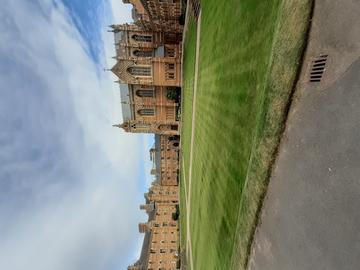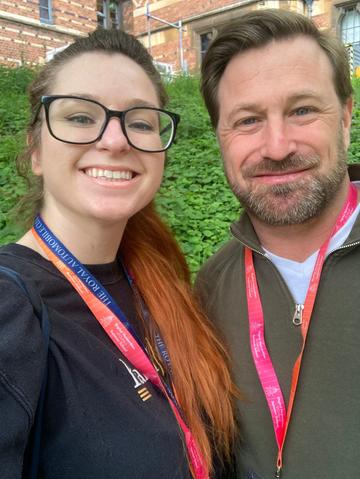DHOXSS 2023 experiences - Introduction to Digital Humanities
Warren Garth Borchardt is a student at Harris Manchester College, University of Oxford, and was awarded a bursary to attend the Introduction to Digital Humanities strand of the summer school.
To find out more about this year's bursaries see here. To join the mailing list and learn about the next summer school sign up here.
In early July of this year (2023), I had the privilege of attending an exciting and unique event, the Digital Humanities Oxford Summer School, (Twitter: @dhoxss), hosted at Keble College in Oxford, and co-ordinated and run by Department of Engineering Science at the University of Oxford (www.eng.ox.ac.uk / Twitter https://twitter.com/oxengsci).
I had learned about the Summer School whilst attending a workshop run by the Bodleian Digital Editions, with Early Modern Letters Online (EMLO), a few months beforehand, guided by some of the great staff who would be lecturing at and running the Summer School; this gave me a taste of the kind of work that is being done by historians, researchers and volunteers, whose diligent efforts are making thousands of such documents available online, worldwide. To the digitisation of these documents is being added all kinds of invaluable metadata for scholars and researchers worldwide to access, digitalise and analyse, from enormous amounts of previously inaccessible information, related to thousands of otherwise unavailable primary source documents.
I was completely intrigued by the possibilities, so I applied for a bursary to attend the Digital Humanities Summer School, and I was really fortunate to be awarded one by the kind people at the Worshipful Company of Stationers and Newspapermakers (The Stationers’ Foundation) in London, to whom I am most grateful. Little did I know what awaited me: the Summer School was wonderfully fun and informative, with attendees, lecturers and guests from all over the globe, many of whom were as amazed as I was at the scope of digital potentialities for the Humanities – and I only attended the Introductory strand! The topics covered were truly mind-boggling: from easy-to-follow modules on the basics of coding, computational thinking and data manipulation; links and tutorials on all kinds of useful websites and digital tools that are proving indispensable to a plethora of organisations. There were lectures by researchers and professionals on real-world, post-pandemic applications in museums, fascinating research projects, online Covid-related memorial projects - even a lively, game-based team activity to make copyright law fun and interesting! It was truly stimulating and inspirational to hear about digital projects archiving and linking large and globally scattered bodies of works, such as the entire works and library contents of Samuel Beckett; the archaeological possibilities and technological challenges presented by the ongoing digitisation of ancient Assyrian cuneiform tablets; the impressive number of the tools for adding vast categories of metadata to such collections, and the capabilities of innovative software to mine and analyse such data.

Keble College (photo by Warren Borchardt)
Throughout the week there were many opportunities for thought-provoking discussions on topics such as the need for digital democratisation and digital sustainability, among a truly diverse and friendly bunch of attendees; throughout, there was a strong emphasis on the importance of training and standardisation in encoding initiatives, providing supportive networks in the global digital sphere, encouraging multi-lingual and geographic diversity, and facilitating global accessibility for researchers everywhere. To top it all off, the staff and organisers were, incredibly helpful, always on hand, friendly and accessible; the college food and accommodation were great; the facilities were outstanding, the events were warm and inviting - and even the British weather was relatively kind to us!
Having recently discovered that my own family is in possession of a large collection of personal letters from an ancestor (George Jardine, Professor of Logic and Rhetoric at Glasgow University from 1787 to 1824, to his son), I am certain that my week at the Digital Humanities Oxford Summer School will prove to be an invaluable launchpad for me, both in terms of making this collection digitally accessible for other researchers, and – ideally - there will be a dissertation project of my own, in the making. I hope in this way to add to global scholarship, and to explore the possibilities for my own future career, or even just to make myself useful as a digital volunteer in some capacity, in other spheres. We all win when we share this kind of data, and when we collaborate to illuminate our heritage for future generations.
My grateful thanks to the staff, organisers and lecturers who made it so easy, such fun and wonderfully informative.

Photo of Warren Borchardt (left) with another summer school attendee, Abby Westmark
Warren Garth Borchardt
Harris Manchester College
University of Oxford.




